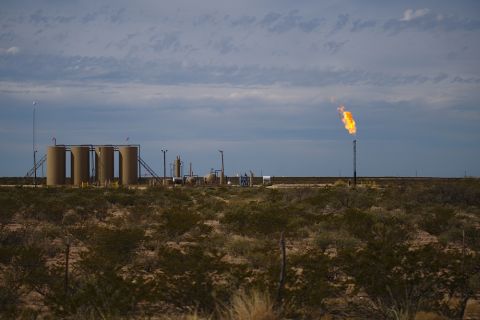
Mark Gordon’s comments reflect brewing backlash in fossil fuel-reliant U.S. states against climate policy. (Source: Image of Gordon from Governor Mark Gordon Facebook page; Shutterstock.com)
The Biden administration’s limits on new oil and gas drilling on federal land will push investment offshore and only benefit Middle Eastern countries, said the leader of one of America’s biggest fossil fuel-producing states.
Mark Gordon, Wyoming’s governor, said the U.S. Interior Department’s moratorium on issuing new permits to drill on public land under its control would “send capital elsewhere”, including to private land in jurisdictions with less environmental oversight such as Texas.
“Ultimately, who benefits from that is going to be the Middle East,” he said in an interview with Financial Times.
His comments reflect a brewing backlash against President Joe Biden’s actions to cut carbon from energy supplies in states where fossil fuel production supports the economy, with the federal drilling moratorium drawing fire even from Democrats. State-level opposition could undercut White House aims.
RELATED:
Biden’s First 100 Days of Oil and Gas Action: He’s Just Getting Started
Analysts disagree on how the pause on federal leases will affect energy supplies, with some saying that overall US oil production may be little changed as operators work through stockpiled drilling permits or migrate to privately held acreage.
But the leasing halt could damage the budgets of states with large parcels of federally owned land, including Republican-controlled Wyoming and Democratic-led New Mexico, which is home to some of the most prolific oil fields in the U.S.
New Mexico’s governor, Michelle Lujan Grisham, told Biden in March that even a modest production fall because of the moratorium would cost the state more than $700m in the next four years, with “real impacts on our ability to achieve major goals like universal access to early childhood education.”
It could also increase emissions by shifting production across the border to Texas where environmental standards are weaker, she wrote to the president, adding: “This runs counter to our shared climate goals.”
Gordon said the moratorium had already disrupted drilling schedules in Wyoming and curtailed spending in his state. “Our school funding is going to get decreased, our state budgets are going to be decreased,” he said. “Our ability to meet healthcare needs is going to be decreased.”
Energy-related activity on public lands accounted for more than $450 million of income in Wyoming last year, Gordon said recently, “the largest source of revenue for schools,” while the sale of leases on federal lands earned $35 million annually in the past eight years.
Tribal lands, which are managed by the Interior Department’s Bureau of Indian Affairs, have already been exempted from the moratorium.
Mark Fox, chair of the Mandan, Hidatsa and Arikara Nation, three affiliated indigenous tribes that produce oil on the Fort Berthold Reservation in North Dakota, told the Financial Times last week that they won the exemption following extensive lobbying after the moratorium was announced.
“It was one of the quickest turnarounds ever,” he said. “Less than 24 hours and they said, ‘You’re exempted from this.’”
But not Wyoming, which is also suffering from the steady decline of its once-powerful coal sector.
Gordon said the coal industry was “very much imperiled” by Biden’s plan to make the U.S. power sector carbon-free by 2035, and called for federal funding to help make costly projects to capture CO₂ emissions viable.
Such technology would be critical to the state’s hopes of achieving “net negative” emissions in the next three decades, Gordon acknowledged.
The Trump administration granted Wyoming money for research into alternative coal uses beyond power generation, an effort to arrest some of the sector’s decline.
Wyoming still supplies about 40% of the U.S. coal burned in power plants, but coal’s share of the country’s electricity market has more than halved in the past decade and last year was just 19%, less than renewable energy.
Gordon last month signed a bill that provided $1.2 million in state funds to pay for lawsuits against other states that caused shutdowns of coal power plants in Wyoming or tried to curb exports of coal. Previous litigation failed to force Washington state to open a coal-export terminal on its coast.
Recommended Reading
Balticconnector Gas Pipeline Back in Operation After Damage
2024-04-22 - The Balticconnector subsea gas link between Estonia and Finland was severely damaged in October, hurting energy security and raising alarm bells in the wider region.
Waha NatGas Prices Go Negative
2024-03-14 - An Enterprise Partners executive said conditions make for a strong LNG export market at an industry lunch on March 14.
Balticconnector Gas Pipeline Will be in Commercial Use Again April 22, Gasgrid Says
2024-04-17 - The Balticconnector subsea gas link between Estonia and Finland was damaged in October along with three telecoms cables.
Pembina Pipeline Enters Ethane-Supply Agreement, Slow Walks LNG Project
2024-02-26 - Canadian midstream company Pembina Pipeline also said it would hold off on new LNG terminal decision in a fourth quarter earnings call.
TC Energy's Keystone Oil Pipeline Offline Due to Operational Issues, Sources Say
2024-03-07 - TC Energy's Keystone oil pipeline is offline due to operational issues, cutting off a major conduit of Canadian oil to the U.S.


